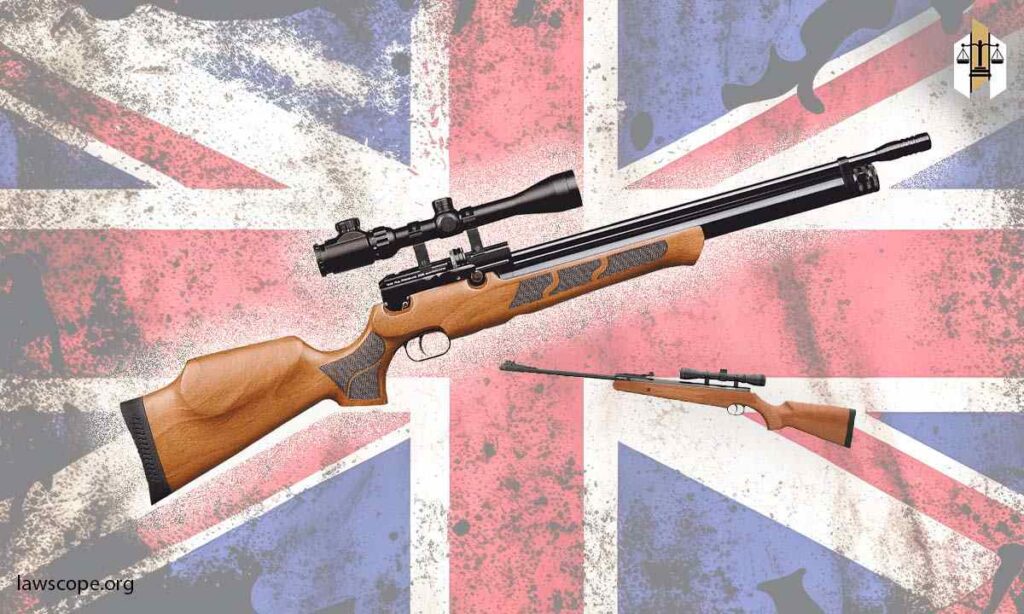
Recently, there has been a surge of interest among people in the UK regarding air rifle shooting enthusiasts and sportsmen. This growing popularity underscores the importance of understanding corresponding laws. This manual seeks to shed light on key aspects of UK air rifle laws, including ownership, usage, storage, and licensing requirements.
Knowing The Fundamentals of UK Air Rifle Laws
Before delving into the nuances of UK law, it is imperative to understand the fundamental principles governing the ownership and use of air rifles.
Part of the weapons legislation is the legal framework that governs air rifles, with specific regulations created to take into account the special characteristics of air guns.
Definition and Classification
- Defining Air Rifles: UK law categorizes air rifles as firearms, albeit falling into a distinct class from traditional firearms. An air rifle’s projectile is usually propelled by a piston or another mechanism and is usually driven by compressed air or gas.
- Subcategories of Air Rifles: In the context of air rifles, distinctions exist based on their power and capabilities. These categories influence the specific regulations applicable to each type of air rifle.
Licensing Requirements
- Overview of Licensing: In the UK, there are license criteria that must be met in order to possess and use an air rifle. Comprehending the various licensing categories is essential for legitimate ownership.
- Standard Air Gun License: For air rifles with a muzzle energy not exceeding 12-foot pounds (16.27 joules), a standard air gun license suffices. This license is obtainable through a straightforward application process.
- Firearm Certificate for High-Powered Air Rifles: Air rifles exceeding the 12-foot-pound threshold necessitate a firearm certificate. This more rigorous application process involves additional scrutiny to ensure the applicant’s suitability and compliance with safety standards.
Ownership and Usage Regulations
With a clear understanding of the licensing requirements, it’s imperative to delve into the regulations governing the ownership and usage of air rifles in the UK.
Age Restrictions
- Minimum Age For Ownership: The minimum age for owning an air rifle in the UK is 18 years. This restriction applies to both standard air gun licenses and firearm certificates.
- Supervised Usage For Minors: While ownership is restricted to those 18 and older, minors aged 14 to 17 may use air rifles under the direct supervision of a responsible adult who holds the necessary license.
Prohibited Persons
- Persons Prohibited From Owning Air Rifles: UK air rifle laws explicitly prohibit certain individuals from owning or using air rifles. This includes individuals with a history of criminal offenses, those subject to restraining orders, and individuals with mental health concerns.
- Verification of Suitability: During the licensing application process, authorities conduct thorough background checks to determine the applicant’s suitability for air rifle ownership.
Location Restrictions
- Restricted Shooting Areas: Air rifles must not be discharged within 50 feet (15 meters) of the center of a public road or right of way. This regulation aims to prevent accidents and ensure the safety of the public.
- Trespassing Considerations: Respecting property borders and getting permission from the landowner before firing are crucial when using an air rifle. UK legislation prohibits trespassing while in possession of an air rifle.
Storage Regulations For Air Rifles
Proper storage of air rifles is a critical aspect of ensuring safety and complying with UK air rifle laws.
Regulations governing the storage of air rifles are designed to prevent unauthorized access, theft, and accidents.
Adhering to the air rifle storage laws UK is essential for responsible ownership and prevention of unauthorized access.
Secure Storage Requirements
- Locked Cabinets or Gun Safes: Air rifles must be stored in secure cabinets or gun safes when not in use. These storage units must be constructed and maintained to specific standards to prevent unauthorized access.
- Ammunition Storage: Ammunition for air rifles must be stored separately from the rifles themselves, adding an additional layer of security and reducing the risk of accidents.
Transportation Considerations
- Safekeeping Air Rifles: Air rifles need to be unloaded and placed within a gun box or cover before being transported. By taking this precaution, both the carrier and everyone nearby are guaranteed to be safe.
- Use of Gun Slips: Utilizing gun slips during transport provides an additional layer of discretion and security. It helps prevent unnecessary attention and ensures that the air rifle is not visible to the public.
Enforcement and Penalties
It’s critical to comprehend the possible repercussions of breaking these rules in order to preserve compliance with UK air rifle laws.
Law enforcement organizations possess the jurisdiction to investigate and punish anyone discovered to be in violation of air rifle regulations.
Enforcement Agencies
- Role of Local Police: Air rifle laws are usually enforced by local police units within their authority. They are able to conduct assessments, investigate reports of mistreatment, and take appropriate action against violators.
- Cooperation with Firearms Licensing Units: To process license applications, carry out background checks, and guarantee that people fit the requirements for air rifle ownership, firearms licensing units collaborate with local police.
Penalties For Non-Compliance
- Seizure of Air Rifles: When situations of non-compliance with air rifle laws, law enforcement has the authority to seize air rifles. This action is taken to prevent further misuse and protect public safety.
- Criminal Charges and Fines: Those found in breach of air rifle regulations may be subject to penalties and criminal prosecution. The type and degree of the offense decide the severity of the consequences.
Related Content: Gun Crime Lawyer: Your Guide To Finding The Best Representation
FAQ (Frequently Asked Questions)
After understanding UK air rifle laws, explore common questions you may have. Let’s delve into them together.
Q1. Are There Any Laws Against Air Rifles in The UK?
A1. In the UK, there are no outright bans on air rifles; however, ownership and use are subject to specific licensing requirements and regulations to ensure responsible ownership and prevent misuse.
Q2. What Are The Laws Behind Air Rifles UK?
A2. Firearms laws apply to air rifles in the United Kingdom. Those who wish to own air rifles with muzzle energies less than 12-foot pounds must get a firearm certificate or a regular air gun license.
Ownership is limited to individuals who are present at least eighteen years old, and safekeeping procedures must be followed to avoid unwanted access.
Q3. What Are The UK Laws on Air Rifles?
A3. Gun laws apply to air rifles in the United Kingdom. When it comes to rifles, owners need to be at least eighteen years old, receive a normal air gun license (for muzzle energy under 12 foot-pounds), and a weapon certificate (for models with greater power).
May You Like Also: Domestic Violence Lawyer in the USA | Protecting Your Rights
Conclusion
In conclusion, a thorough understanding of air rifle law uk is paramount for fostering a responsible and compliant airgun community. To sum up, understanding the complexities of UK air rifle legislation is crucial for proper ownership and use.
Anyone looking to participate in air rifle activities must be aware of the license requirements, ownership standards, storage guidelines, and possible fines.
Enthusiasts can follow their interests while guaranteeing their own and others’ safety by abiding by these laws. Maintaining awareness and adherence to air rifle regulations fosters a responsible and upbeat airgun community in the UK.
A clear understanding and adherence to air rifle laws UK are essential for fostering a safe and responsible airgun community.
You May Like Also:



2 thoughts on “UK Air Rifle Laws 2024: Everything You Need To Know”